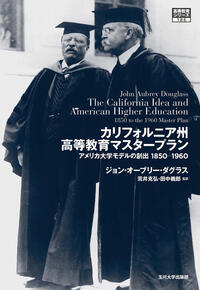CSHE Senior Research Fellow John Aubrey Douglass shared insights on the current higher education landscape with the Cal Alumni Magazine.
All News
July 3, 2025
June 27, 2025
CSHE Senior Resarch Fellow John Aubrey Douglass discusses the role of Congress in stopping the Trump administration's attack on American higher education.
The Chronicle spoke with Eaton about his latest paper Elite Embeddedness and what his work can tell us about how America got to this point in its views of college.
June 24, 2025
Applications for fall 2025 Gardner Fellowships and Gardner Seminar for UC doctoral students are now open!
For detailed information, please visit: https://cshe.berkeley.edu/training/gardner-program
June 13, 2025
"Garcia believes that regardless of whether the lawsuit is successful, it’s already done damage to HSIs by dragging them—and enrollment-based MSIs in general—into the country’s political skirmishes over diversity, equity and inclusion.
She worries that students are the ones who will suffer if HSIs no longer receive dedicated funding.
June 12, 2025
"Garcia (2019) noted that while the federal government defines what constitutes an HSI–a full-time undergraduate enrollment in which 25% of students identify as Latinx–it offers no guidance on what servingness actually means or looks like. Garcia advises HSI leaders to take a holistic and multi-dimensional perspective on servingness and to ensure indicators of servingness are reflected in institutional structures such as their mission and purpose, leadership practices, polices, curriculum, co-curricular offerings, and advancement activities.
"John Aubrey Douglass, a senior research fellow and research professor at Berkeley’s Center for Studies in Higher Education, notes that Project 2025, the 900-page policy proposal that Trump disavowed connection to during his campaign, included plans to eviscerate or dismantle the Department of Education, order an end to DEI programs, and revoke certain foreign students’ visas—all of which is now being carried out."
May 27, 2025
“While Harvard is the victim of the moment, it’s a warning and unprecedented attempt of a hostile federal government to erode the autonomy of all major universities in the U.S.,” said John Aubrey Douglass, a senior research fellow at the Center for Studies in Higher Education at the University of California, Berkeley.
May 22, 2025
As the Spring 2025 semester comes to a close, we want to thank you for being part of the CSHE community. Below, you’ll find updates on our programs and events.

May 19, 2025

May 14, 2025
On May 14, 2025, Student Borrower Protection Center's Press Release "Stealing the American Dream": Borrowers, Experts Warn of Trump's Scheme to Raise Costs, Block Opportunity for Students and Families featured CSHE faculty affiliate Jonathan Glater.
May 11, 2025
Community College Daily's recent report "Overcoming transfer obstacles with AI" featured CSHE faculty affiliate Zachary Pardos, Associate Professor of Education and the Director of the Computational Approaches to Human Learning (CAHL) research lab at UC Berkeley.
April 28, 2025
April 24, 2025
A new Forbes report, authored by Bryan Penprase (Vice President for Sponsored Research & External Academic Relations, Soka University of America) featured the latest findings from the SERU Multi-Engagement Report.
April 15, 2025
CSHE's Igor Chirikov and John Aubrey Douglass published an article at University World News entitled "Study finds lingering impact of COVID on student experience," featuring the recently released SERU Multi-Engagement Report.
April 11, 2025
A new article from Inside Higher Education entitled "Data: Students Less Involved on Campus Post-Pandemic" features SERU Multi-Engagement Report.
April 8, 2025
About the Center for Studies in Higher Education and the California Policy Lab
March 31, 2025
As we close out March, CSHE reflects on a month filled with insightful events, new research, and critical conversations about the future of higher education. We hosted thought-provoking discussions on women STEM faculty and released the latest SERU report, offering fresh insights into student experiences and institutional challenges.
March 26, 2025
CSHE DirectorJesse Rothsteinrecently spoke withKQEDabout the UC hiring freezes and the long-term impact of financial uncertainty on US universities. He raised urgent concerns about:
Impact on Research & University OperationsThe University of California receives about $4 billion annually in federal research funding, distributed through thousands of competitive grants. With uncertainty about future funding, universities must carefully manage resources to avoid financial shocks.
- « first Full listing: News
- ‹ previous Full listing: News
- 1 of 16 Full listing: News
- 2 of 16 Full listing: News (Current page)
- 3 of 16 Full listing: News
- 4 of 16 Full listing: News
- 5 of 16 Full listing: News
- 6 of 16 Full listing: News
- 7 of 16 Full listing: News
- 8 of 16 Full listing: News
- 9 of 16 Full listing: News
- …
- next › Full listing: News
- last » Full listing: News
